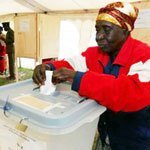
The Zimbabwe Electoral Commission (ZEC) is yet to pay for the vehicles it hired for the referendum, drawing the ire of drivers who feel shortchanged, it has emerged.
Report by Our Staff
The referendum was held on March 16 this year.
The commission had reportedly promised to pay immediately after the referendum, but three weeks later the owners of vehicles say they have not received a cent.
Speaking on condition of anonymity, some vehicle owners and drivers said they had failed to get a satisfactory answer from the elections body on why they had not been paid.
“Our contracts indicated that we had been hired from March 13 to 19 and we thought we would be paid after that,” one of the vehicle owners said. “We have tried to contact ZEC and CMED (Central Mechanical Engineering Department) but we have met no joy.”
He said what heightened their anxiety was that there was nothing explicitly written in their contracts regarding when they will be paid.
The driver, who is based in Gweru, said ZEC had hired 150 cars from the Midlands capital and none of the drivers had been paid.
- Chamisa under fire over US$120K donation
- Mavhunga puts DeMbare into Chibuku quarterfinals
- Pension funds bet on Cabora Bassa oilfields
- Councils defy govt fire tender directive
Keep Reading
“ZEC did not give us advances just in case our cars broke down, so we had to borrow and now we are struggling to pay back the money as there is no communication,” he said.
“Considering the state of our roads, breakdowns and tyre punctures are prevalent and we had to take care of those ourselves.”
Through CMED, ZEC hired cars for the referendum and was to pay between US$60 and US$170 per day depending on the size of the vehicle. The cars were to travel a maximum of 200 kilometres, with ZEC paying between US$0,40 and US$0,80 per kilometre in excess of 200km.
However ZEC spokesman, Shupikai Mashereni said the commission started payments last week and all service providers will receive their dues soon.
“Payments began this [last] week and where there are delays it is an issue of banks,” he said. “Some banks take longer to process payments than others and maybe that could be the reason.”
Mashereni said he was not aware of any certain group of service providers that had been singled out for late payment.
He then asked for questions in writing. Investigations also revealed that civil servants that worked on the referendum had since started receiving their payments.











